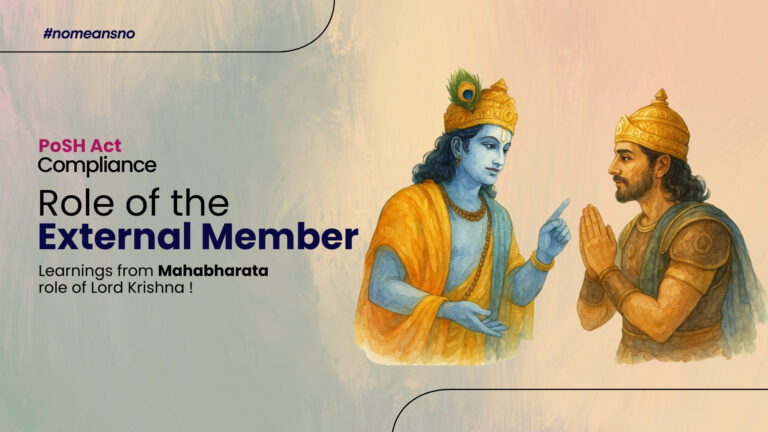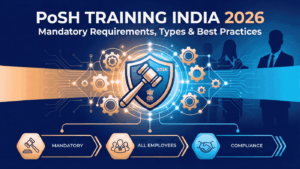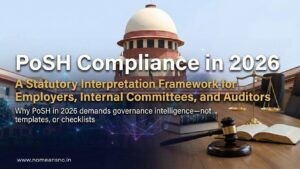Quorum of IC under PoSH Act: A Real POSH Inquiry That Made Me Rethink the “Playing XI”
It’s a pleasant early morning. I’m sitting in my courtyard, overlooking a lush patch of green that has become my thinking space over the last couple of years. A hot cup of black coffee rests beside me — my favourite companion for moments like these. The wind is slightly gusty, just enough to keep the wind chime tinkling in the background. The mood? Reflective, almost poetic.
It’s in moments like this that I gather my thoughts around the things that matter.
And today, what’s been on my mind is a POSH inquiry I was recently involved in — one that challenged not the law itself, but the system around it.
Every POSH inquiry I’ve been part of has its own twist. You name it — no evidence, no witnesses, perception vs intent, third-party harassment, incidents at off-sites, virtual misconduct, consensual relationships that turned messy — I’ve seen them all. But the one that landed on my table last week made me pause and think in a way that few cases have.
It wasn’t about what happened. It was about who was available to investigate what happened.
Let me start by saying this: no two POSH cases are ever the same.
You think you’ve seen them all—lack of evidence, no witnesses, the blurred lines between perception and intent, third-party harassment, the consensual-turned-complaint situation, or even questions about where “workplace” begins and ends.
But then comes a case that throws all your standard structures off the table.
This one started off like many others: an incident at an official party. A moment of physical touch that immediately reminded me of the KPS Gill vs. Rupan Deol Bajaj case—a landmark judgment in India’s legal history around sexual harassment. The case wasn’t complicated from a legal angle. But what made it difficult was… the Internal Committee quorum.
Here’s what we were dealing with:
- The Presiding Officer was on maternity leave and unable to join, even virtually.
- One female Internal Member was the reporting manager of the aggrieved.
- Another male IC member was the reporting manager of the respondent.
- That left just one remaining female IC member, who was junior to both the aggrieved and the respondent.
- And then there was me—the External Member.
Now, anyone familiar with POSH Compliance would immediately understand the pickle here.
Forming a quorum isn’t a box-ticking exercise. It’s foundational. It’s like picking the best XI for your IPL team before heading out onto the field. And just like that, I found myself wishing the “Impact Player Rule” could apply to ICCs (now IC) too.
Let’s unpack this.
The POSH Act and Rules clearly state that a minimum quorum of 3 members is required for an inquiry to proceed. That includes the Presiding Officer as a mandatory part of the panel. But here’s where it gets fuzzy—and this is something that rarely gets discussed in most POSH Training sessions. The rules say nothing about the External Member’s presence in the quorum.
Which is ironic, isn’t it? Because the same Act says having an External Member is mandatory while constituting the Internal Committee.
So, what do some organizations do? They interpret that silence as flexibility—and conveniently leave the External Member out of the inquiry process entirely. That’s where I say: Where is the spirit of the law here?
Ask yourself this: Why is the External Member even a mandatory inclusion in the IC if they’re not meant to be a core part of the fact-finding process?
They’re not just there for optics. We’re supposed to bring neutrality, objectivity, legal understanding, and most importantly—a sense of fairness that’s free of internal bias.
In an ideal world, a strong quorum includes:
- The Presiding Officer
- The External Member
- A neutral Internal Member, preferably with no reporting relationship to either party involved.
Coming back to our case—what do you do when the Presiding Officer is unavailable, and the only two internal members are directly connected to the complainant and respondent?
Do you move ahead with what you have? Or take a pause?
In this scenario, the most junior IC member (hierarchically) is suddenly expected to lead or be “neutral”—but it’s only human for either the complainant or respondent to say, “She reports to him,” or “They’ve been working closely together for years.”
It weakens the perception of neutrality, and in a POSH inquiry, perception matters just as much as facts.
This is why, during all our POSH Training for ICC Members, I encourage teams to think about diversity and depth in the committee.
There’s absolutely no harm in having a 6–7 member IC if you’re a large organization. In fact, it gives you options—flexibility to form a balanced quorum, especially in complex or sensitive cases like this one.
What we often miss is this: even the most robust policies are only as effective as the people who implement them. And those people need structure, support, and clarity.
So where does that leave us with this case?
Yes, we have initiated the inquiry. But it hasn’t been easy. We had to escalate to higher leadership, request a temporary elevation of a neutral member as PO, and explain the need for removing reporting lines from the equation.
It delayed the process—but helped preserve its integrity.
And that brings me to the core message I wanted to share today.
POSH is not just about compliance checklists. It’s about creating an ecosystem where people feel heard, safe, and confident that the process is fair.
Quorum formation isn’t a technicality. It’s a test of an organization’s intent.
Is your system built for convenience? Or for justice?
I’d love to hear from others in the community: Have you ever faced a quorum-related roadblock in an inquiry? What could be a proactive solution to prevent such complications? How can we encourage leadership to invest in deeper ICC structures beyond minimum requirements? Let’s start a conversation that goes beyond definitions and into what real POSH Compliance should look like.
#NoMeansNo






One Comment
I am an external member.
Query is
For each inquiry interview is the quorum necessary ?
Can the interview work be divided amongst the three members of the quorum
Thnx